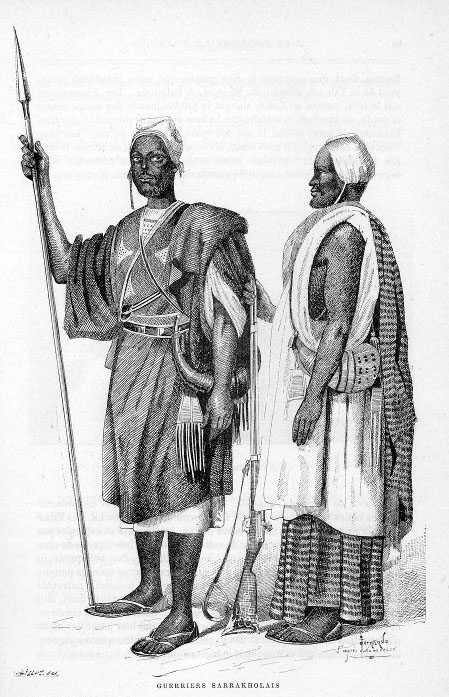Soninke (African people)
Enlarge text Shrink text- 92-114761: Blegna, D. Les masques dan la société marka ... 1990.
- African ethonyms and toponyms:p. 169 (Marka (Markanka, Dafing) Soninke. Mali, Upper Volta)
- Ethnologue:pp. 169, 229, etc. (Soninke (Sarakole, Sarawule, Toubakai, Wakore, Gadyaga, Serahuli, Aswanik, Silabe, Marka) Burkina Faso, Ivory Coast, Mali, Senegal, Mauritania, Gambia, Guinea Bissau)
- Fivaz, S. African languages, 1977:p. 21 (Soninke (Marka, Sarakole, Sarakolle, Saracole, Sarawule, Serahuli, Wakore, Gadyaga, Dyakanke, Toubakai)
The Soninke (Sarakolleh) people are a West African Mande-speaking ethnic group found in Mali, southern Mauritania, eastern Senegal, The Gambia, and Guinea (especially Fouta Djallon). They speak the Soninke language, also called the Serakhulle or Azer language, which is one of the Mande languages. Soninke people were the founders of the ancient empire of Ghana or Wagadou c. 200–1240 CE, Subgroups of Soninke include the Jakhanke, Maraka and Wangara. When the Ghana empire was destroyed, the resulting diaspora brought Soninkes to Mali, Mauritania, Senegal, Gambia, Burkina Faso, Côte d'Ivoire, Guinée-Conakry, modern-day Republic of Ghana, Kano in Nigeria, and Guinea-Bissau where some of this trading diaspora was called Wangara, leading to the saying “when Americans landed on the moon, a Soninke was already there” in Senegal, with other versions across West Africa. Predominantly Muslims, the Soninke were one of the early ethnic groups from West Africa to convert to Islam in about the 10th century. The contemporary population of Soninke people is estimated to be over 2 million. The cultural practices of Soninke people are similar to the Mandé peoples, and those of the Imraguen of Mauritania. They include traditional Islamic rites of marriage, circumcision, and have social stratification.
Read more on Wikipedia >
 Topic
Topic








